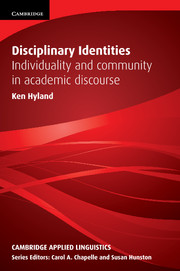Book contents
- Frontmatter
- Contents
- Series editors’ preface
- Preface
- Acknowledgements
- Notes on corpora and abbreviations
- 1 Identity: Interaction and community
- 2 Discipline: Proximity and positioning
- 3 Investigating identity
- 4 Identity in representational genres
- 5 Self-representation in academic bios
- 6 Culture: Authority and visibility
- 7 Reputation: Individuality and conformity
- 8 Gender: Disciplinarity and positioning
- 9 Identity, disciplinarity and methodology
- Appendix: Items with potential metadiscourse functions
- References
- Name Index
- Subject Index
1 - Identity: Interaction and community
Published online by Cambridge University Press: 09 February 2023
- Frontmatter
- Contents
- Series editors’ preface
- Preface
- Acknowledgements
- Notes on corpora and abbreviations
- 1 Identity: Interaction and community
- 2 Discipline: Proximity and positioning
- 3 Investigating identity
- 4 Identity in representational genres
- 5 Self-representation in academic bios
- 6 Culture: Authority and visibility
- 7 Reputation: Individuality and conformity
- 8 Gender: Disciplinarity and positioning
- 9 Identity, disciplinarity and methodology
- Appendix: Items with potential metadiscourse functions
- References
- Name Index
- Subject Index
Summary
Identity is who and what you are. But while this is a simple enough statement to make, how we experience and manage our sense of self is far more complex. This is because we tend to see ourselves as unique individuals with a ‘true’, stable identity locked away deep inside us, yet we also recognise that our behaviours, affiliations and even our ways of talking shift through encounters with different people, often creating tensions and conflicts. Added to this there is also a range of different ways of theorising identity, each producing a different definition and way of approaching it. The current centrality of the concept of identity in the human and social sciences, in fact, suggests something of this slipperiness. So for some observers identity is what unifies our experience and brings continuity to our lives; while for others it is something fragile and fragmented, vulnerable to the dislocations of globalisation and post-industrial capitalism.
There is, however, general agreement on the idea that there are various forms of identity that people recognise, and so identity involves identification. In identifying myself as a man, for example, I am identifying myself with a broader category of ‘men’, or at least some aspects of that category. At the same time, or more often at other times, I may be identifying myself as a vegetarian, a hiker or a son. No one has only one identity, and, for a subset of the population, an important aspect of who they are relates to their participation in academic disciplines: they are physicists, historians or applied linguists. These different identities have to be managed because they impact on each other rather than simply add to each other, so the way I enact an identity as a teacher is influenced by my identity as middle-aged, British and so on. This book explores what academic identity means: how it is constructed by individuals appropriating and shaping the discourses which link them to their disciplines.
This chapter reviews some of the work on identity to set out a view which argues for the importance of interaction and community in identity performance, but I want to begin by presenting some key ideas up front.
- Type
- Chapter
- Information
- Disciplinary IdentitiesIndividuality and Community in Academic Discourse, pp. 1 - 21Publisher: Cambridge University PressPrint publication year: 2012

